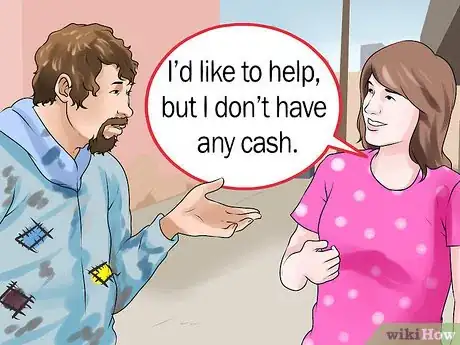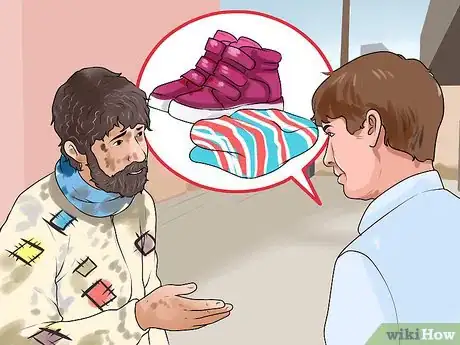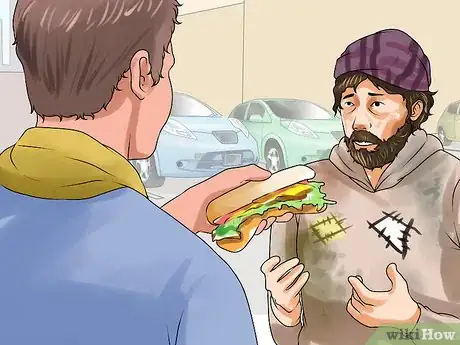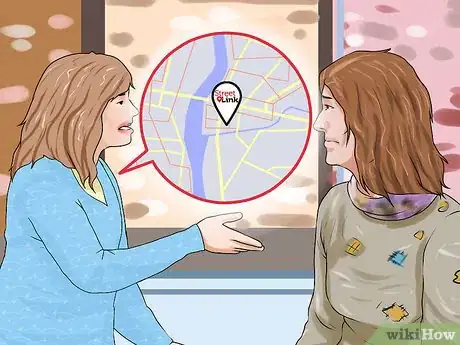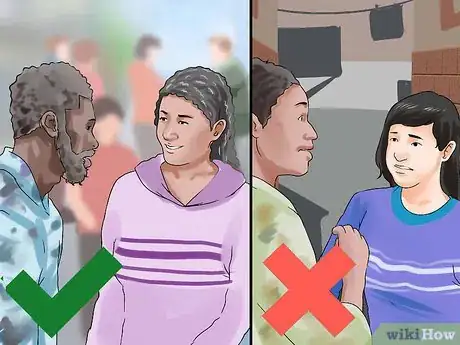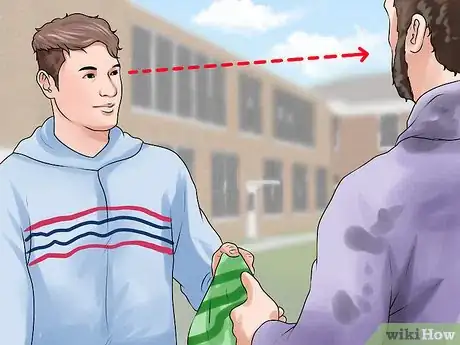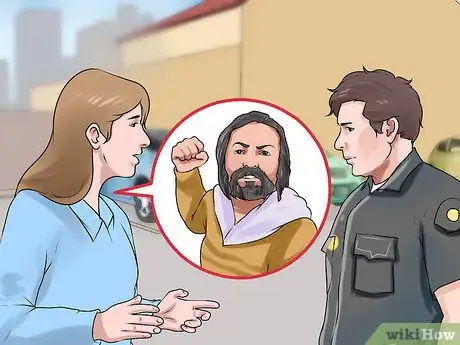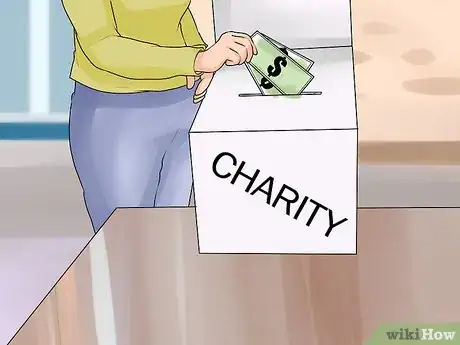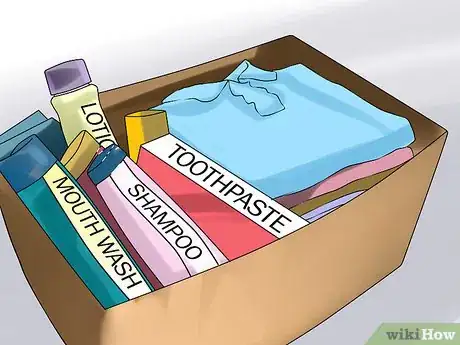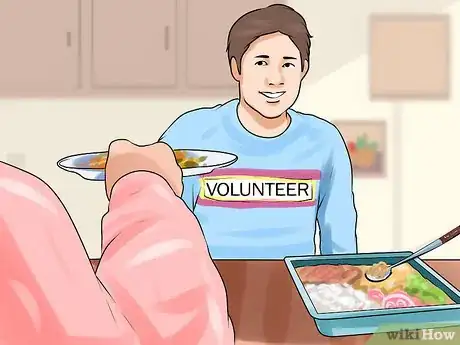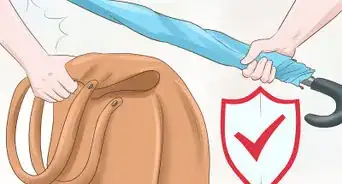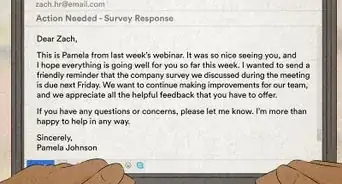This article was co-authored by Dan Bodner. Dan Bodner is a Transitional Shelter & Homelessness Expert and the CEO & Founder of QuickHaven Transitional Shelters. With over 20 years of experience, he specializes in executive leadership, product development, and innovation, which have helped him develop modular tiny homes to improve the lives of those affected by homelessness. Dan earned a BA from Vassar College and an MS from the University of Texas at Austin.
There are 10 references cited in this article, which can be found at the bottom of the page.
This article has been viewed 168,014 times.
When you’re in a city, you’ll likely encounter people who ask you for money. Sometimes it’s hard to walk away from a beggar. However, giving beggars money will only provide a very short term solution to a long standing problem.[1] By treating beggars with dignity, exercising some street smarts, and working with local charities and shelters, you can make a difference.
Things You Should Know
- Don’t ignore beggars if you can; nod, smile, and communicate with compassion.
- Explain that you don’t have any money, or that you’ve only got credit cards on you.
- If a beggar becomes aggressive, do not hesitate to alert the police, run, or solicit help from others nearby.
- Donating to shelters and charities, or offering beggars food or water, can be much more helpful than giving someone loose change.
Steps
Dealing with a Direct Encounter
-
1Acknowledge the beggar. Instead of ignoring them, look at them. Nod, smile, or say hello to show you are aware of their presence. This is a compassionate response that won’t cost you any money.[2]
-
2Refuse to give money politely. A flat “No” to their request might seem rude and uncaring. Instead, try something like, “I’d like to help, but I don’t have any cash.” It’s respectful, and it allows you to avoid feeling like a villain.Advertisement
-
3Ask the beggar what they need. You could give your spare change, but you can’t control what it will be used for. Instead, if it’s safe to do so, ask what they would like to buy. If they need a bus ticket, offer to buy one for them. If they’re wearing shoes in poor condition or covering themselves with newspapers, ask their shoe size or offer to bring a blanket. This sees to their physical needs and also gives them the dignity and respect that money can’t buy.
-
4Offer food. If you’re near a restaurant or café, offer to buy a cup of coffee or a sandwich. This will allow you to address the beggar in a way that’s helpful and open. You also can at least be assured they’ll have food or a warm beverage.
- Keep in mind some beggars may trade food for other goods or services. You can’t control this once you hand them the food. This doesn’t happen all the time, but it’s good to keep this in mind so you are aware of the possible downsides of giving a beggar food.
-
5Direct the beggar to a shelter. If you think they might be sleeping on the street, let them know the location of the nearest homeless shelter. This will help them get off the streets, at least for a night. It will also connect them with services that could give them the means to rise out of their situation. To find shelter locations around the world, visit:
Keeping Yourself Safe
-
1Stay where people can see you. Speak with beggars on busy, well-lit streets. Remain standing, as crouching or sitting makes you less visible. Don’t follow anyone into an empty alleyway or dark corner.
-
2Keep your eyes on the beggar. If you’re giving directions or handing over some food, don’t look away from the beggar. Distraction is a common tactic thieves use to rob victims with good intentions.[5] While most beggars aren’t criminals, you should always use caution.
-
3Remain in your car. While driving, you might be tempted to help a beggar at a traffic light by getting out of your car. This holds up traffic and puts you in danger of a traffic accident. Acknowledge them with a nod or a smile, but do it from your car.
-
4Protect yourself from aggressive beggars. If a beggar becomes aggressive, you shouldn’t allow yourself to be bullied. Shout to draw attention to yourself. Walk into a nearby business and ask for assistance. If you see a police officer in the area, tell them about your situation.
Donating to Charities or Shelters
-
1Give money to a local charity. Look for charities that help people stay off the streets and provide support for the homeless. If you’re concerned about beggars in a country you’re visiting, look for a charity that focuses on a specific need, such as providing school books and supplies for children. This will keep them in school and off the streets.[6] To ensure your money will go where it’s needed, you could check out:
-
2Support a homeless shelter. Donate money. This will help to improve your community and give you a way to support homeless people in your area. You can also donate items other than money. You could consider:
- Oral hygiene products like toothbrushes, toothpaste, and dental floss.[9]
- Personal hygiene products like baby wipes or sanitary napkins.
- First aid supplies like bandages and antiseptic wipes.
- Clothing, especially old winter coats and shoes.
-
3Volunteer at a shelter or a local charity. You can serve meals, help sort through donations, and provide other services as needed. Contact your local shelter for volunteer opportunities. Get involved with charities that you donate to so you can feel the direct impact of your financial donation.[10]
Community Q&A
-
QuestionI gave someone $3 for gas. She told me a sad story, but then she drove away without getting gas. How do I not get caught off guard like this? How can I not be fooled?
 Community AnswerPeople are selfish and will manipulate you. You can either harden up and never help anyone, or stay how you are and expect to get fooled once in a while. Just shrug it off and keep being a good person. If this same thing happens again, go in the gas station with her and purchase the gas yourself.
Community AnswerPeople are selfish and will manipulate you. You can either harden up and never help anyone, or stay how you are and expect to get fooled once in a while. Just shrug it off and keep being a good person. If this same thing happens again, go in the gas station with her and purchase the gas yourself. -
QuestionHow do I address a friend who is asking me for money, when I believe he wants the money to support a drug addiction?
 CelesteCommunity AnswerIt can be hard to say no to someone who constantly asks for money, but you mustn't let your friend take advantage of you. I would recommend telling a white lie and saying you're sorry, but you don't have any money. You might also want to confront your friend about his/her drug addiction and warn him/her about the negative effects of drugs on people's health and mental state. A good friend should be a good influence in this way.
CelesteCommunity AnswerIt can be hard to say no to someone who constantly asks for money, but you mustn't let your friend take advantage of you. I would recommend telling a white lie and saying you're sorry, but you don't have any money. You might also want to confront your friend about his/her drug addiction and warn him/her about the negative effects of drugs on people's health and mental state. A good friend should be a good influence in this way. -
QuestionHow do I ask my friend to return my money politely?
 Tom De BackerTop AnswererKeep it simple. Just say, "Hey, how about that money I gave you awhile back?" Try to make the friend feel as if this money between you does not jeopardize anything else. Ask them what the plans are, maybe he's working to get it together in one big payment, or is having some difficulty getting monthly payments started.
Tom De BackerTop AnswererKeep it simple. Just say, "Hey, how about that money I gave you awhile back?" Try to make the friend feel as if this money between you does not jeopardize anything else. Ask them what the plans are, maybe he's working to get it together in one big payment, or is having some difficulty getting monthly payments started.
References
- ↑ https://www.theatlantic.com/business/archive/2011/03/should-you-give-money-to-homeless-people/72820/
- ↑ http://www.sciencedirect.com/science/article/pii/S0261517715001302
- ↑ http://www.streetlink.org.uk/
- ↑ http://www.homelessshelterdirectory.org/
- ↑ https://www.ricksteves.com/travel-tips/theft-scams/tourist-scams
- ↑ http://www.slate.com/articles/double_x/doublex/2013/09/giving_money_to_child_beggars_don_t_do_it.html
- ↑ http://www.charitynavigator.org/
- ↑ https://www.givingwhatwecan.org/top-charities/
- ↑ http://www.homelessshelterdirectory.org/cgi-bin/id/article.cgi?article=14
About This Article
When a beggar asks you for money, you can politely refuse, give them change, or offer to help them some other way. Whichever choice you make, look the beggar in the eye and give a polite smile to acknowledge them. If you don’t want to give them money, say something like, “I’d like to help, but I don’t have any cash,” or “Sorry, not today.” It’s entirely up to you if you want to give them cash, but keep in mind that you can’t control how they’ll spend that money. If you want more control over your money, offer to buy them food, clothes, or a blanket. For more tips, including how to donate directly to homeless charities and shelters, read on.

